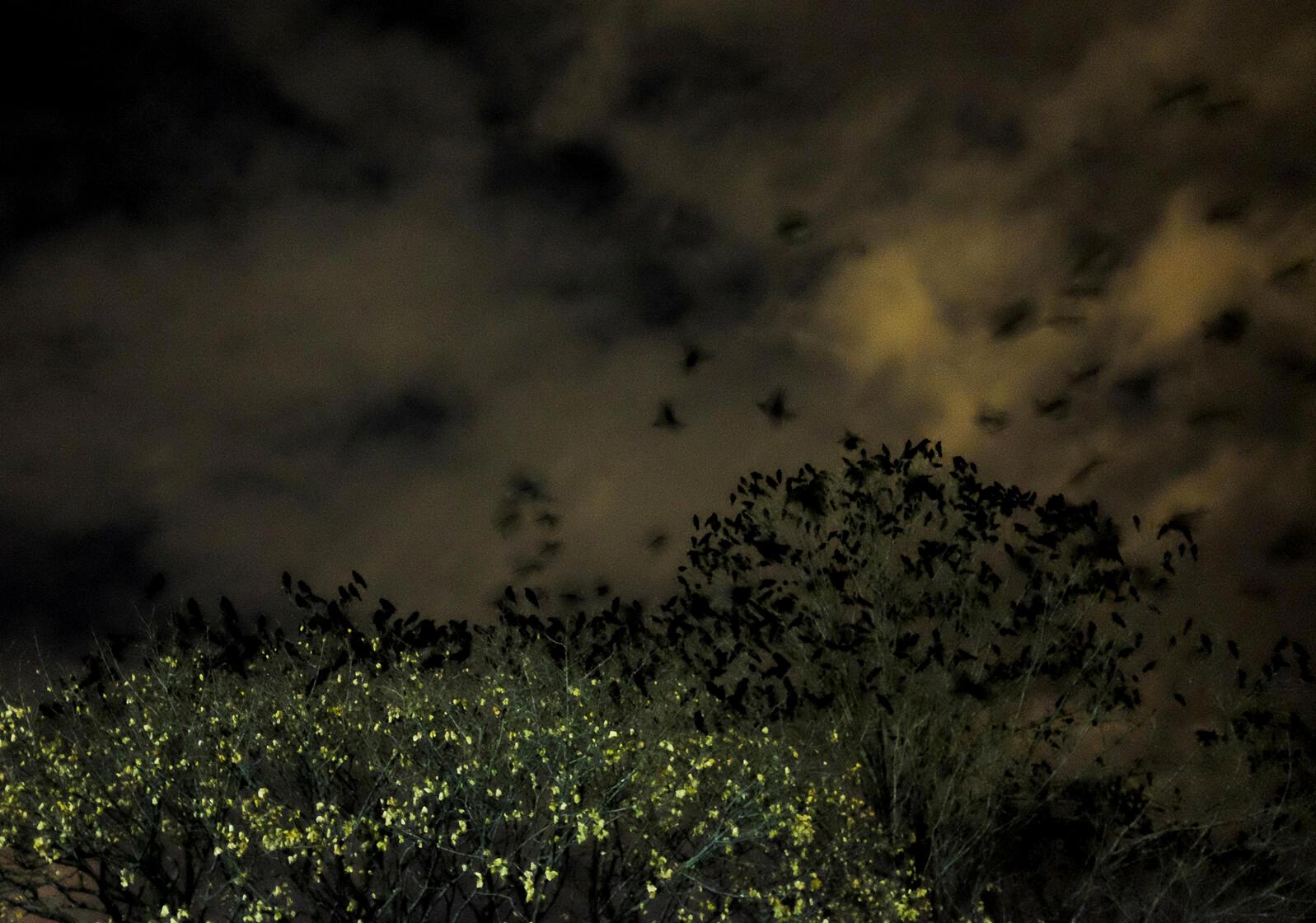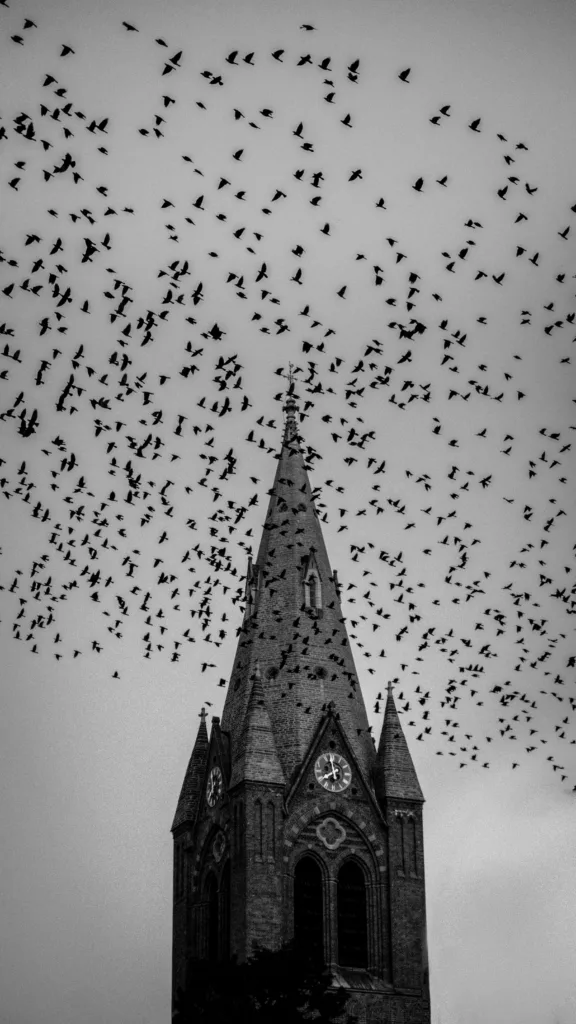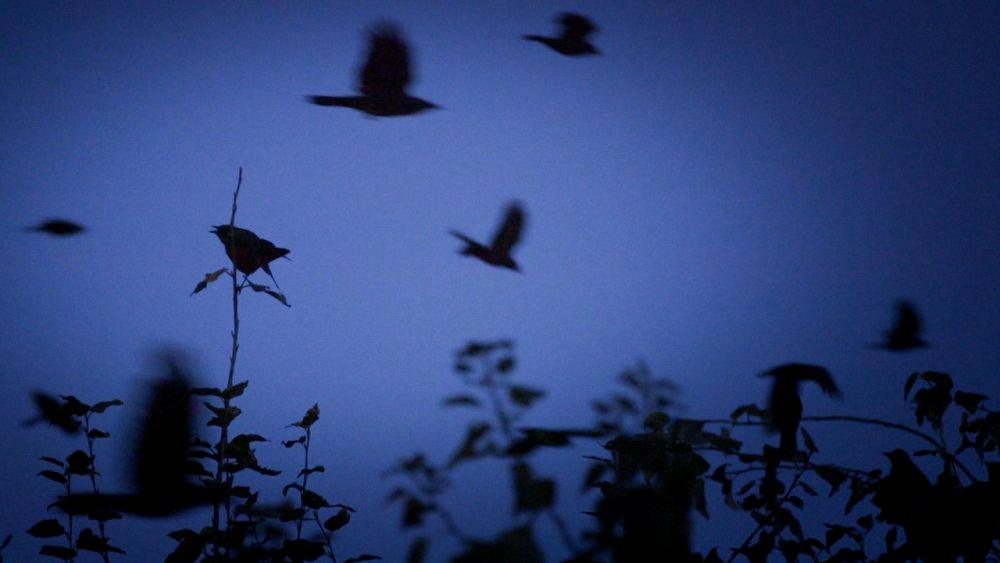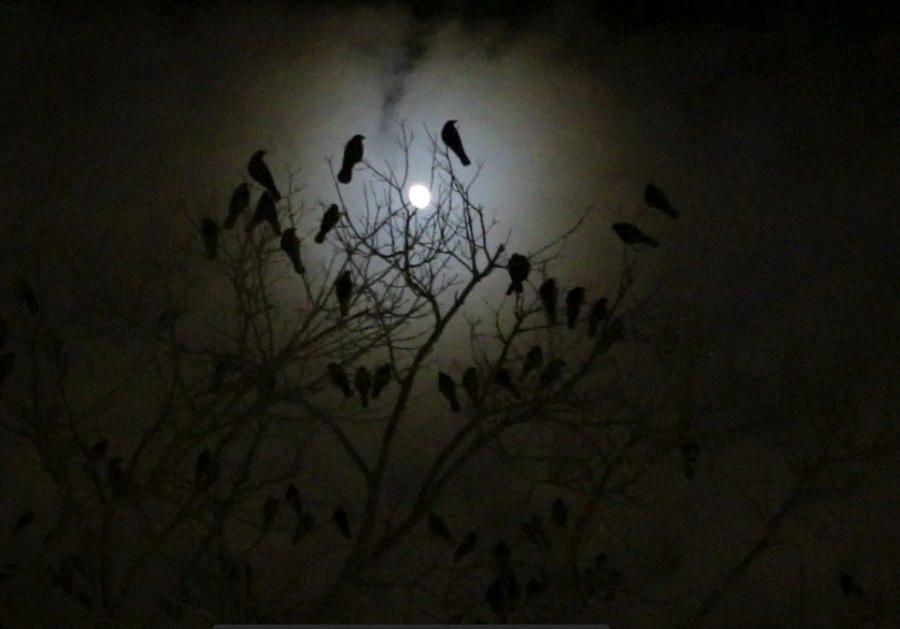Have you ever heard a flock of crows cawing at night and wondered what they were doing? Well, you’re not alone! Crows are diurnal birds, meaning they’re active throughout the day. But when night falls, crows gather in large flocks to roost in a spot where they have good visibility and reasonable shelter.
This phenomenon is known as the “night roost” and it serves an important purpose in the crow community. At night, crows are almost defenseless against predators so they seek safety in numbers. The more birds in the roost, the better chance they have of avoiding danger.
When the night roost begins to form, you’ll often see crows flying around and making noise. They typically gather in trees or on tall structures like power lines or buildings. As more birds arrive, they filter down through the branches until everyone has settled into their spot for the night.
The idea of a large group of birds gathering together at night has long been steeped in folklore and mysticism with some cultures believing that it was an omen of death or evil approaching. However, science tells us that this behavior is perfectly normal for crows and there is nothing sinister about it!
So next time you hear a flock of crows calling out at night, just remember that it’s likely just them gathering together for safety befoe settling down for the evening.
The Meaning of Crows Cawing at Night
When crows are heard cawing at night, it is often said to be a sign of bad luck or an omen of something ominous. While many cultures have their own interpretations of the crow’s call, the majority agree that it is not a good sign. Generally speaking, the nocturnal cawing of a crow is believed to indicate that something bad will happen in the near future.
The association between crows and misfortune dates back centuries and has been documented in folklore throughout the world. Ancient Greeks and Romans believed that hearing crows at night was an indication of impending death, while Native American tribes viewed the birds as symbols of death and destruction. In some cultures, crows are thought to be harbingers of war or signalers of danger and illness. In other traditions, they are seen as messengers from the spirit world who bring warnings about potential disasters or tragedies that may occur in our lives.
Today, most people still associate hearing a crow at night with negative energy or events. While this belief may not have scientific backing, it can certainy cause us to pause and reflect on our own lives – perhaps prompting us to take extra care when making decisions or preparing for what lies ahead.

Source: audubon.org
Do Crows Exhibit Nocturnal Activity?
No, crows are not active at night. Since they are diurnal, they roost and sleep like most other songbirds during the night. If you do hear crows cawing at night, it could be a sign of danger in their environment.
The Mystery of Crows Gathering at Night
Crows gather at night in order to stay safe from predators. They form large flocks and roost in areas that offer good visibility and shelter, such as rural areas or nearby towns. Cities are especially attractive for crows because there are fewer predators willing to be close to humans. By forming flocks and roosting together, crows can keep a lookout for danger and protect each other during the night.
What Happens to Crows at Night?
At night, crows will gather together in a communal roosting spot, usually located in a park or woodland. They will arrive in droves and settle into the trees where they can converse with one another and get some rest. As more birds arrive, those that had settled earlier are pushed lower down the branches until there’s hardly any room left. The crows will hoot and chirp to each other until the sun rises again and it is time for them to disperse.
Do Crows Serve as Warning of Danger?
Yes, crows do warn of danger. Crows are very intelligent birds and are known for their ability to quickly adapt to changing circumstances. To alert other members of their group of danger, crows will often post “sentries” who watch for potential threats from a higher perch. When the sentry spots danger, it will call out a loud alarm that can be heard by other crows in the area. This alerts them to fly away or hide, depending on the situation. These sentry calls can also warn other animals in the vicinity of possible danger and can be used as a form of communication beween members of different crow groups.

Superstitions Surrounding Crows
The superstition regarding crows is an old and widely-held belief that seeing a certain number of crows can be a sign of bad luck or even death. Seeing 5 crows is seen as a sign of impending sickness, while seeing 6 crows is thought to bring death. To ward off any bad luck associated with these sightings, some people suggest tipping your hat if you see a magpie – a bird closely related to the crow.
How to Scare Away Crows
Crows are generally afraid of large, unfamiliar objects that move suddenly or make loud noises. This can include balloons that are brightly colored and reflect light, shiny objects like aluminum pie tins or old CDs that spin in the wind, scarecrows with brightly-colored clothing, and loud noises such as firecrackers and recorded crow distress calls. Crows also avoid areas where they have seen other crows being attacked by predators, so incorporating natural predators like owls into your garden may help to keep them away.
The Benefits of Having Crows Around
Yes, crows are good to have around. Crows are highly intelligent birds and can benefit their local environment in many ways. They help control populations of pests like insects, rodents, and small reptiles that would otherwise become a nuisance. They also act as scavengers, consuming dead animals and helping to keep the environment clean. Furthermore, crows are important seed dispersers, helping to spread plant species across their habitat. Despite the occasional mess they can make in garbage cans or gardens, crows play an important role in the natural balance of their environment and should be valued as beneficial neighbors.
What Factors Attract Crows to an Area?
Crows are attracted to an area if they find a suitable roosting site, a source of food, and safe places for nesting. Tall trees in a yard provide ideal roosting sites as crows can often nest up to 60 feet in the air. In addition, crows feed on a wide variety of food sources such as grains, fruit, insects, carrion and small animals. Lastly, crows may consider water features such as a koi pond an acceptable substitute for rivers when looking for safe places to nest.

Source: wbur.org
The Significance of Crows as an Omen
Crows are widely considered to be an omen of both good and bad luck, depending on the number of crows that are seen. It is believed that seeing one crow indicates bad luck, while two crows signify good luck. Three crows mean health, four crows mean wealth, five crows indicate sickness is coming, and six crows mean death is nearby. While these beliefs have been around for centuries, it is important to note they are based in folklore rather than scientific evidence.
Do Crows Have the Ability to Remember People?
Yes, crows do remember people. Studies have shown that crows can remember a human face associated with a stressful situation for up to five years. This means that if a crow experiences something negative when they see you, they will remember you and be able to recognize you again in the future. Crows also have been known to “warn” their friends about humans by making alarm calls when they see humans approaching. This further demonstrates their ability to remember and recognize individuals.
The Significance of a Black Crow Staring at You
When a black crow stares at you, it is thought to carry a positive meaning. It may mean that the crow finds you interesting, and recognizes spiritual or psychic qualities in you that are uncommon amongst most people. Crows are known for their intelligence and curiosity, so it is possible that the crow is simply intrigued by something about you. It could also be a sign of good luck, as crows have long been associated with omens of good fortune throughout many cultures and mythologies.
Can Crows See In The Dark?
No, crows cannot see in the dark. Crows are diurnal birds, meaning they are active and feed during the daylight hours. At night, their vision is limited and they rely mainly on their other senses such as hearing and smell to find food and avoid predators. Owls, on the other hand, have excellent night vision due to a high number of rods in their eyes; allowing them to hunt prey in the dark. In fact, crows can even recognize owl-shaped silhouettes against the night sky and will often fly away when they spot one!

Source: pittnews.com
Consequences of Crow Shouting in Front of House
If a crow is heard cawing in front of your house at night, it could be interpreted as an omen of impending change. This could mean that something positive or negative is about to occur, or someone in your family may become ill or pass away soon. It is important to remember that this is just an omen and not necessarily a sign that something bad will happen. Ultimately, it can be seen as a reminder to stay strong and be prepared for whatever changes may come your way.
Do Crows Have Long-Term Memory of Those Who Hurt Them?
Yes, crows have been shown to remember the faces of humans who have threatened or harmed them. The findings of a recent study suggest that this memory likely lasts for the bird’s lifetime. Not only do crows recognize and scold people who have caused them harm, but they also enlist their family members and even strangers into their “mob” to help them protect themselves from dangerous people. This behavior indicates a remarkable level of intelligence and demonstrates that crows are able to remember and recognize human threats over long periods of time.
Conclusion
Crows are diurnal birds, meaning they are active during the day but roost and sleep like most other songbirds at night. When crows caw at night it could mean that there is danger arund them, as they are almost defenseless and gather in large flocks to roost in spots with good visibility and shelter. In cities, they take advantage of the fewer predators willing to be near people. Crows congregate in rural areas too, often heading to their night roosts which become giant avian slumber parties where birds arriving late force the early birds lower into the trees. Overall, crows’ cawing at night can be a sign of danger and is often associated with mysticism and occultism in history.
